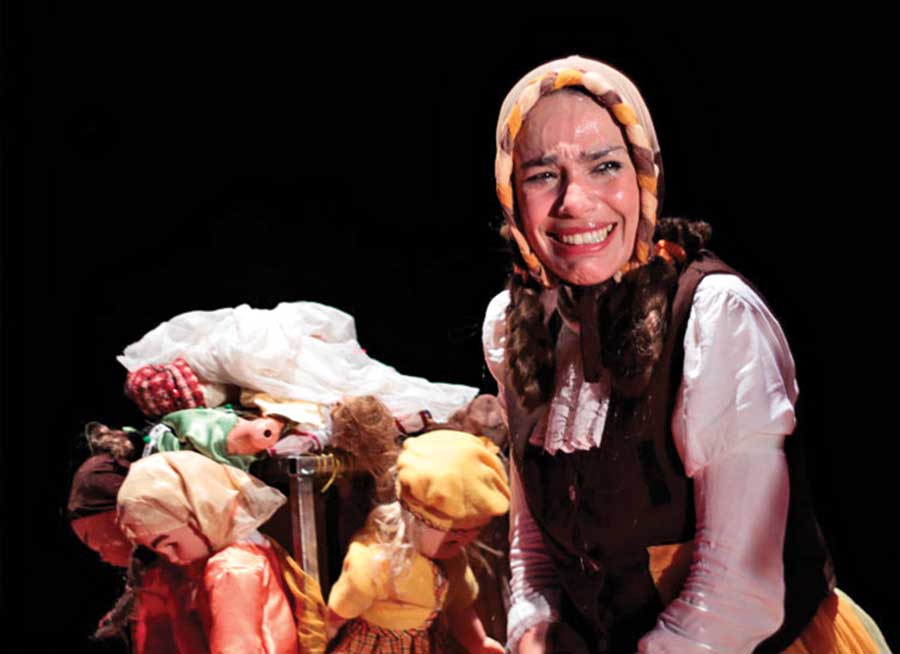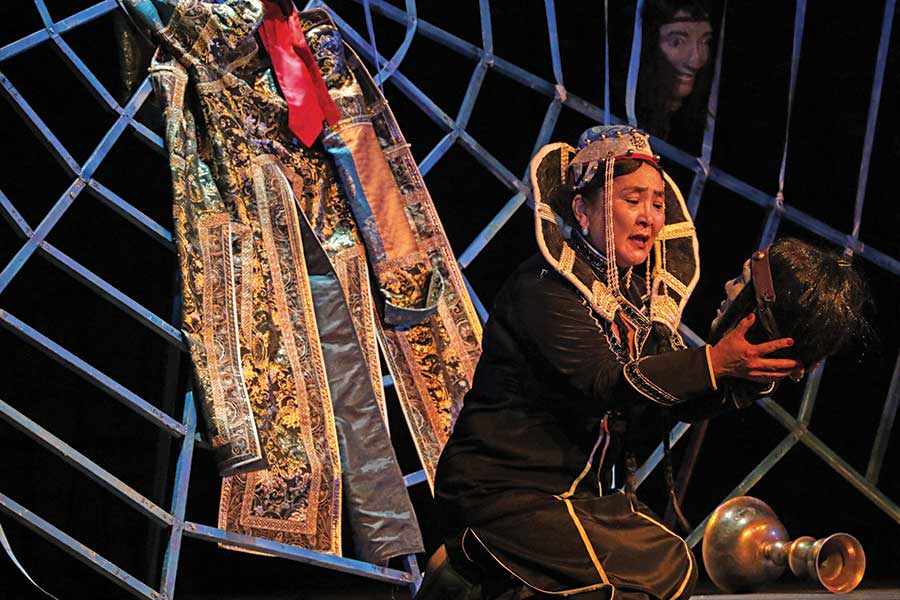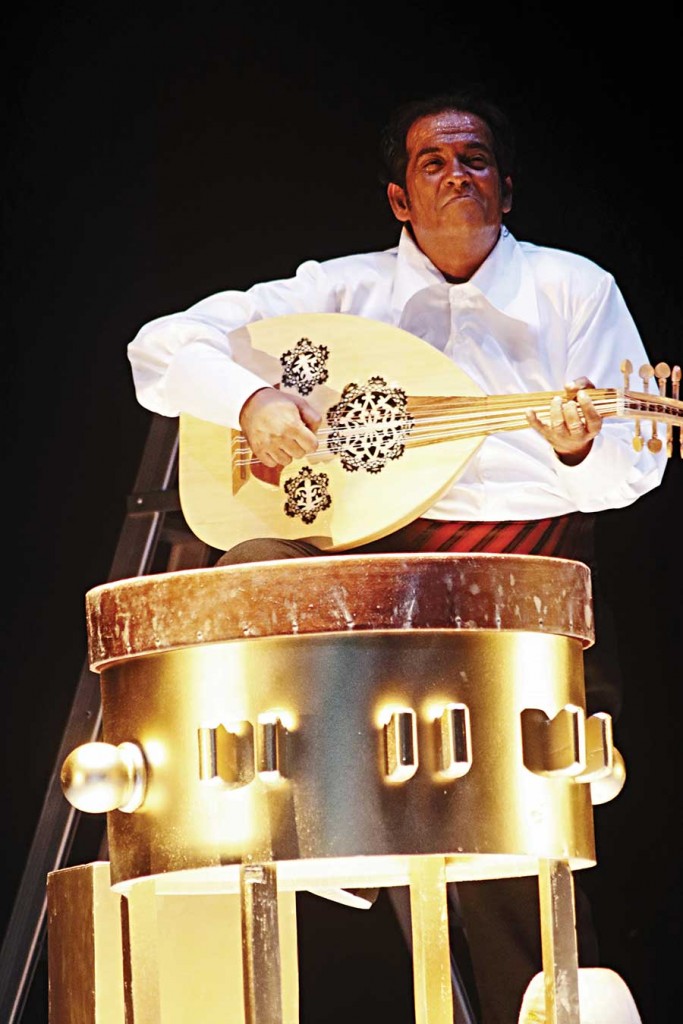It is fate, flowing like thick clouds…no one seems to move here in my present time. Yes, I was asleep, absent…but I have risen, returned. We are still broken by what (I have) done…(I) tempted the world in the East and West. (I am) the reason for all the destruction that is taking place. It is not the work of those occupying armies, not the weakness of the politicians and the soldiers everywhere that is at fault. It is (mine) alone. —Mofleh Al-Odwan, Elegy for the Fifth String
In the popular mind the United Arab Emirates is an oasis of prosperity imprinted with luxury. Sprung up less than 45 years ago from tribal desert culture, now a leading oil producer, the country and its most populous cities, Dubai and Abu Dhabi, have become the envy of the entrepreneurial world. Though some call it a story of luck, most economists, including former U.S. Deputy Secretary of Commerce Robert Mallett, credit the leadership involved. Founding emir Sheikh Zayed Al Nahyan, who died in 2004, enjoys broad acclaim for having balanced the demands of diversity and unity; for creatively combining tribalism, modern statecraft, and federalism; and for his patience, generosity, and flexibility of vision.
On the surface, Dubai’s lesser known sister, Fujairah, fits the UAE mold of picturesque affluence. The only one of the seven emirates situated on the Gulf of Oman, it boasts higher rainfall and mountainous terrain, and is studded with world-class resorts, villas, malls, mosques, a castle, and a heritage village. That has made it an ideal host for an extraordinary biennial festival of monodramas Fujairah has quietly produced since 2002, with support from the International Theatre Institute, part of UNESCO. This past February, the Fujairah International Monodrama Festival happily coincided with, and was folded into, a 10-day International Arts Festival of dance, music, and theatre.
But the monodrama gatherings, including the most recent, have not offered comfortable escapism amid the posh surroundings. Fujairah’s ruler, Sheikh Hamad bin Sultan Mohammed Al-Sharqi, chose the form of monodrama—a.k.a. the solo show—to create a dialogue between East and West, self and other, in a harmonious way that politics has failed to achieve; the pieces at the festival have accordingly engaged the darker sides of paradise. At the most recent gathering, each soliloquy on the agony of extremism, terrorism, or the dislocation of ethnic cleansing was performed with the intimacy of local theatres but with global impact. Each stage became a platform for self-scrutiny, reevaluation, and projection for a better future.
Dr. Omnia Amin, who introduced and translated Elegy for the Fifth String, wrote that the monodrama competition “created a vital space for creative expression that was definitely missing in the Arab world; it has allowed new talent to arise, giving rise to a connected spirit that is ready to face challenges and explore new spaces.”
Of course, this is not brand-new: The Arab world has a rich history of oral folk literature in which professional storytellers recount tales with themes of adversity and eventual triumph, as in Marrakech’s legendary town square, Jemaa el-Fnaa. One genre is known as the sirah (“life” or “biography”), often based on historical characters. In the West, the best known of these tales is One Thousand and One Nights. It is perhaps a cliché that the past is remarkably present in the region, but, as Shaig Safarov, the Azerbaijani director of the Baku International Theater Conference, noted, “Despite the luxury cars, Arabs maintain many of the Middle Ages’ cultural traditions. Theatre has always been more refined and developed in Persia (modern Iran). In the Turkic world there were storytellers called ozans; they created epic poems, such as The Epic of Manas in Kyrgyzstan or Dada Gorgud in Azerbaijan.” He also noted the Azerbaijani tradition of ashugs who tell their stories while playing an oud-like stringed instrument called the saz.
The most deeply Eastern-seeming of the Fujairah monodramas, The Storyteller Khokha’s Tale, had a special place in the festival; Saaed Al Fedawi’s mellifluous voice flowed seamlessly between speaking and singing. Mohammed Al Arousi adapted this love story between an orphan boy and his cousin from a Tunisian folk tale: As children they plant a peach tree together in the yard and are in heaven until the boy’s father tears them apart. The story raises questions about the eternity of love once its soil has dried and no one is left to water it.
During interludes in the opening ceremony, a man delivered monologues from a horse that referenced, according to Safarov, the Persian Ta’ziyeh, a form of passion play for mourning. “The difference,” he said, “is that Ta’ziyeh represents religious dramas about the life of the saints in Islam, while whatever we could see in Fujairah probably carried a military spirit.” In 1969, British director Peter Brook, enthralled at seeing Ta’ziyeh for the first time, famously said, “This is what has been missing from Western theatre for a long time.”

American theatre has a long tradition of solo shows detailing the authors’ journeys from disenfranchisement to fulfillment—a form of having our say. Samantha Harvey writes in a 2015 New Yorker article, “The Age of Monologues,” about the power of a monologue “to acquire a kind of authority…inherently unreliable…because what he or she says is not contended by anyone…With each retelling, the fabric is woven slightly differently. Monologues are self-verifying and self-referencing, a world in their own right, one with its own internal logic that strengthens with reiteration.”
Western monodramas tend to rely on autobiographical, psychologically realistic protagonists who build linear empathy toward a marked resolution of singular self-reliance or individual success. The monologues I saw in Fujairah, meanwhile, were striking in their use of more Eastern time signatures, multi-poetic settings, and more plural or civic protagonists who could metonymically shift, replace, and layer into each other. They seem to use more vocal musicality, more direct indictment of self and audience as antagonistic, more transformation of interior emotion into choreography, and more open-ended, ongoing practice rather than the resolved endings typical in their Western equivalents.
In the monodrama Amchouta from Spectacle Pour Tous, Morocco, written and directed by Hamza Boulaiz and performed by Jalila Talemsi, a waitress takes the name of her local Tangier café because she’s worked there continuously for 15 years. Her boss fires her for becoming pregnant and hence too “ugly” to serve the customers. Amchouta’s vengeance ensues while the audience sips the tea and soup she serves. This story could be seen as following what we in the West might think of as feminist revenge fantasy. But it could also trace some lineage to travelling players once called muhabazeen, whose roots extend into Egyptian history, with its improvisation and audience interplay.
Talejten Please, written, directed and performed by Rawan Halawi, follows somewhat familiar feminist tropes of sexual harassment and pressures of career and motherhood, while a migration to Sweden and subsequent return to Lebanon provoke bicultural dissonance. Halawi finds success by claiming a barstool in Lebanon and her own freedom to be who she really is: a solo actress.
In Meera, from Algeria’s Mosaic Theatre, we witness at least three phases of time in the life of a street performer who makes puppets out of straws and canvas. Featuring Souad Janati, and written and directed by Hichem Houari Boussahela, the show begins with the arrival of a letter from Meera’s lover warning her of the horrors of terrorism and fascism. The show follows her as she works, laughs, aspires, and falls in love, but ultimately she finds herself tortured randomly, a casualty of the very terrors the letter foretold. The script could be seen as a warning letter to the audience that the simple, decent person is always the victim of the game. Meera performs her own interrogation, which breaks her spirit; she does not enact revenge but exits with her puppets, taking her memories with her.

Coming from farther east, while using one of the West’s most iconic subjects, Lady Macbeth from the Drama Saint Muse Academy was perhaps the most inciting, agitating, and provocative offering in the festival. Adapted by D. Mendsaikhan, produced and performed by S. Sarantuya, directed by B. Munkhdorj and D. Sainchimeg, it did not foresee a positive endgame for female ambition. Boloroo Nayanbaatar, president of the Mongolian ITI Center, described the Mongolian concept of uiliin ur: “Uil” refers to actions or deeds, and “ur” refers to a seed or seedling, with the upshot being “you get what you deserve.”
At the end of her life, talking to the decapitated head of her husband as she goes mad, Mrs. Macbeth moves like a spider caught in a web of truth and justice. As Nayanbaatar put it: “When it comes to ambition, it doesn’t matter if you’re a man or woman. You can’t escape the results of your deeds and it doesn’t necessarily lead to destruction, but being greedy like a bottomless ocean leads to complete destruction. So watch your thoughts, don’t give them to devils, because they will work on your greed and nurture your evil thoughts into actions.”
From Italy’s We Were Monkeys Productions came Immota Manet: Don’t Move!, which was comprised of many small stories heard, lived, or imagined around a real 2009 earthquake in the city of L’Aquila, the hometown of director/performer Luigi Guerrieri. Guerrieri, influenced both by his LeCoq training and by working with a storyteller from Burkina Faso in West Africa, delivers a soliloquy that lurches like an earthquake and keeps arriving “like Christmas” until it shudders, splits, twists, bucks, undulates, ravages, and collapses his own body and voice into a heap of virtual ruin, dust, and collapse. Guerrieri then becomes the only anonymous man who didn’t leave L’Aquila, who parked his car in front of the remains and slept there, singing drunkenly into the darkness and writing poems on the broken walls of the piazza.
Guerrieri writes:
How can you speak about the earthquake? How can you describe the fact that everything which normally is inanimate and secure, for 30 seconds moves like a living creature and maybe disappears? …when you were not there? To leave…because there was an earthquake, to go where? To abandon, to accept, to leave, as if it were easy, in order to forget, to not arrive, to find something, to leave something? That which is mine, broken and torn apart but mine, like always, with the fixed stones, mine, to leave for where? Out of necessity, with the good or with the bad, to leave under pressure, with a smile and many farewells to the home. Which home? And if I leave, I’ll come back, and I won’t move, I’ll keep resisting, with my arms open to the sky…always this Earth under my feet that screams. But where are you going? You stop here… you stop here…come home…just the way you left it…when instead it’s actually the moment to stay!…This silence, heavy…sparkling like champagne…There is a famine, around the corner, but where is the corner! Where is the door? Where is the hope? Take this waltz, take this waltz…Earthquake in L’Aquila…
The festival winner Elegy for the Fifth String had some truly extraordinary moments in performance, spoken from the heart of what might be called a civic protagonist condemned by extremist groups for his art and blamed as the source of corruption in society. Presented by the Fujairah Culture and Media Authority, written by Jordanian writer Mofleh Al-Odwan, performed by Abdulla Masoud, and directed by Firas Al Masri, Elegy does not present the singular linear triumph familiar in Western monodrama, but a soliloquy pondering an artist’s civic or plural identity and complicity:

How can I reveal my identity while I am being chased? Every group accuses me of belonging to another group; I have never been anyone except (myself)…I am still running away after the first threatening letter I received at the beginning of my career…after my death at the height of my beauty, giving and singing? I am a performer of peace…a browser of God’s luxuries. I look at the painting of life around me. I translate it into a hymn of gratitude. I used to play my estrangement and sadness in all places…I am the blacksmith of the people, the king of colors. I set the whole world singing. Is there no one sane on this stretch of earth who can stop the extremist’s violence against the strings of the oud? They are conspiring to cut the fifth string, to erase with it the cheapness of death…severing a vein from the chambers of the heart. I fix it…starting with the string of love. The string of forgiveness. The string of creativity. The string of dialogue. They are the chords of life.
In the Turkish monodrama Rumination—performed by Mehmet Nuri Arkan, directed by Emre Erdem, dramaturgy by Jale Karabekir, commissioned by UNESCO’s ITI Fujariah Centre FIAF, and Istanbul’s Theatre Painted Bird—there are multi-poetic connections between seven tasks prescribed by the universal poet Rumi. Arkan’s dance with pomegranate/grenades feels infinite, an ongoing and timeless practice in which we all engage:
Be like a river of generosity; be like the sun in compassion and grace; be like the night, to hide the mistakes of others; be like the earth in modesty and humility; in tolerance be like the sea; Either seem as you are or be as you seem.
The dancer floats between singular and plural, able to decipher the antagonism within, and a need for guidance beyond self-determination.
“Nothing is spared in these texts, not even the audience,” noted Dr. Amin. “The audience is addressed directly, criticized, questioned, and involved. The voice of the characters’ humanity is one, their vision, hopes, pains, and sufferings are one. All wars have become one, all problems have united, all dreams are the same.”
Ruth Margraff serves as writing program chair and associate professor at the School of the Art Institute of Chicago. Her writing includes the plays Seven and Previously Blue, as well as six martial arts operas with the late composer Fred Ho.


